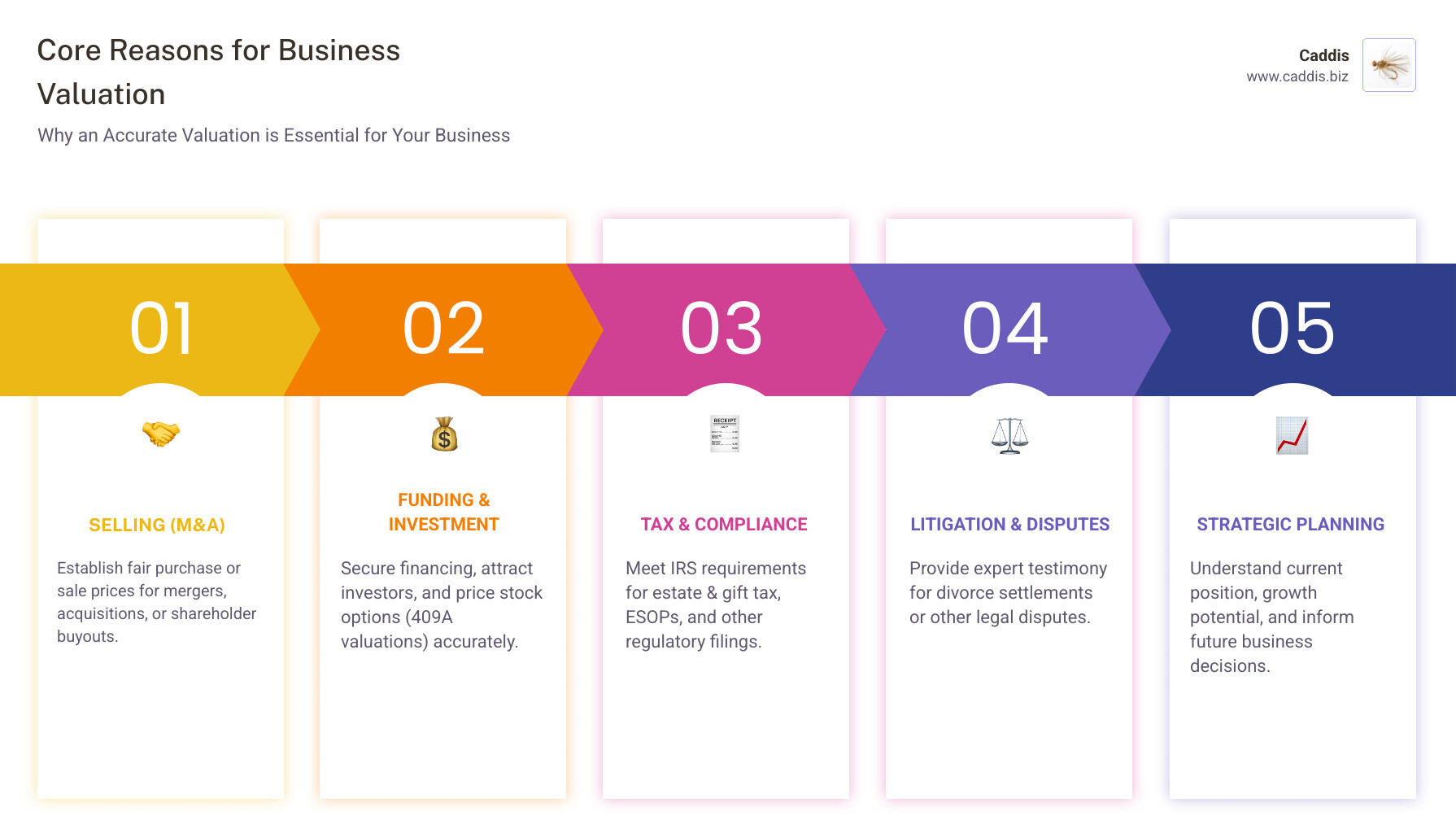Introduction: What is Business Valuation and Why Does It Matter?
Business valuation companies help determine the economic worth of a company through professional analysis of its financial performance, market position, and growth potential. Here are the top reasons businesses need valuation services:
- Mergers & Acquisitions – Establish fair purchase or sale prices
- Estate & Gift Tax Planning – Meet IRS requirements for tax reporting
- Shareholder Buyouts – Determine fair value for ownership transfers
- Divorce Settlements – Value business interests in marital estates
- Litigation Support – Provide expert testimony in legal disputes
- Employee Stock Ownership Plans (ESOPs) – Annual valuation requirements
- 409A Valuations – Stock option pricing for private companies
- Strategic Planning – Understand current position and growth potential
For most business owners, their company represents their life’s work. Whether you’re planning an exit, seeking investment, or need compliance reporting, an accurate valuation provides the foundation for critical financial decisions.
The foundation of business valuation lies in understanding how a company creates value by deploying capital to generate returns that exceed the cost of that capital. This process involves analyzing historical performance, future projections, and market conditions to arrive at a defensible estimate of worth.
Professional valuation firms use three primary approaches: the income method (discounted cash flow), market method (comparable transactions), and asset-based method (net asset value). The art of valuation comes from applying these tools with professional judgment gained through years of experience across different industries and business cycles.
I’m Jeff Mount, and through my work with financial advisors and small business owners, I’ve seen how business valuation companies provide the critical insights needed for strategic decision-making. My experience helping businesses implement growth systems has shown me that understanding your company’s value is the first step toward maximizing it.

Key Triggers: When Do You Need a Business Valuation?
Knowing when you need a business valuation is as crucial as understanding what it is. A professional assessment provides clarity and confidence during key business moments. Here are the most common reasons to engage a valuation firm:
- Mergers & Acquisitions (M&A): To set a fair, defensible price, whether you’re buying or selling a business.
- Estate & Gift Tax Planning: To comply with IRS regulations when transferring business interests and to avoid tax complications.
- Shareholder/Partner Buyouts: To establish an objective value for shares during ownership transitions, preventing disputes.
- Divorce Settlements: To ensure the fair division of marital assets when a business is involved.
- Litigation Support: To provide expert financial analysis for legal disputes, such as shareholder disagreements or damage claims.
- Employee Stock Ownership Plans (ESOPs) & 409A Valuations: To determine the fair market value of company stock for employee compensation and to comply with tax laws.
- Purchase Price Allocation (ASC 805): To properly allocate the purchase price of an acquired company to its various assets and liabilities for accounting purposes. You can learn more about this here.
- Strategic Planning: To understand your company’s current value, identify key growth drivers, and make informed decisions about the future. We discuss this in our Business Strategy Articles.
- Securing Financing: To provide lenders and investors with a clear, credible picture of your company’s financial health.
The Anatomy of a Valuation: Methods and Key Factors
Determining a company’s worth is both an art and a science, blending rigorous analysis with professional judgment. A comprehensive valuation considers several key factors:
- Financial Performance: Analysis of historical sales, profits, and cash flow.
- Economic and Industry Conditions: The broader economic climate and specific industry trends.
- Future Outlook: The company’s growth plans and projected financial performance.
- Intangible Assets: The value of non-physical assets like brand reputation, intellectual property, and customer relationships. A key part of this is the goodwill calculation.
Tracking your company’s Key Performance Indicators (KPIs) is crucial for understanding and improving its value.
A Guide to the Top Business Valuation Companies

When evaluating business valuation companies, keep these essentials in mind:
- Credentials: Prioritize designations like CPA, CFA, ABV, ASA, CVA, or CBV.
- Industry Expertise: Seek firms with direct experience in your sector.
- Audit-Ready Reports: Reports must be well-documented and regulator-compliant.
- Client Service & Communication: Look for transparency, responsiveness, and clear explanations.
- Turnaround Time: Confirm typical timelines and the availability of expedited service.
- Cost Transparency: Make sure fees are disclosed up-front with no hidden extras.
How to Select the Right Firm for Your Needs
- Define Your Purpose – Sale, tax planning, litigation, or strategic planning all have different reporting standards.
- Assess Complexity – Multi-entity structures or significant intangibles often require deeper expertise.
- Consider Company Size – Match your business size to the firm’s typical client profile.
- Look for Specialized Experience – Niche industries (e.g., Web3, healthcare, oil & gas) benefit from hyper-specialized firms.
- Ask for Sample Reports – Review depth, clarity, and presentation.
- Review Testimonials & Case Studies – Verify the firm’s track record.
- Search Locally if Needed – For face-to-face support, explore Business Valuation Companies Near Me.
Examples of Leading Business Valuation Companies
| Firm | Type | Notable Strengths |
|---|---|---|
| Houlihan Lokey | Global full-service | 400+ valuation pros worldwide; comprehensive financial & valuation advisory |
| Kroll | Global full-service | Leading risk & financial advisory; vast resources and global reach |
| Stout | Global full-service | Strong in valuation, financial opinions, and transaction advisory |
| Eton Venture Services | Boutique & specialized | Audit-ready, defensible 409A & M&A valuations; turnaround as fast as 1 day |
| Teknos Associates | Boutique & specialized | Deep expertise in technology and life-sciences sectors |
| MPI (Management Planning, Inc.) | Boutique & specialized | 80+ years of valuation experience; proven IRS-defensible reports |
| Valuation Research Corp. (VRC) | Independent global | Valuation-only focus since 1975; broad industry coverage |
| GCF Valuation | Niche expertise | Authored SBA valuation procedures; SBA-compliant valuations |
Career Spotlight: Working for Business Valuation Companies
A career in valuation offers strong compensation, balanced hours (typically 40–50 per week), and excellent exit opportunities.
- Entry-Level Compensation: About $60k–$80k (2020 figures), with bonuses up to 25% of base salary.
- Senior Roles: Partners/MDs can earn $250k–$500k+, with Big 4 equity partners targeting $1M by generating ~$4–5M in annual revenue.
- Skill Development: Extensive financial modeling, data analysis, and report writing.
- Exit Opportunities: Investment banking, private equity, corporate development, equity research, and restructuring advisory. For deeper insights, explore View Details on finance courses.
We are confident in our ability to guide you through the complexities of business valuation, ensuring you’re empowered with the knowledge and tools to make informed decisions for your company’s future.
The Valuation Engagement: Costs, Timelines, and What to Expect
So, you’ve made the smart decision to get a business valuation. What comes next? It’s a bit like building a house: you need a plan, materials, and a good team. The process typically involves a structured engagement with the chosen business valuation company. It’s a collaborative effort, and your timely input can really make a difference in how quickly things move along.

Here’s a general overview of what you can expect during your valuation journey:
It all starts with an Initial Consultation. This is your chance to chat with the valuation firm about exactly what you need. You’ll discuss the purpose of the valuation and get into the nitty-gritty of your business. This helps them understand the complexity and scope of the work ahead.
Once everyone’s on the same page, the firm will send over an Engagement Letter. Think of this as your official agreement. It clearly lays out the services they’ll provide, the fees involved, what you’ll receive (the deliverables!), and the expected timeline. It’s all about setting clear expectations right from the start.
Next up is Information Gathering. This is where your help really shines! The valuation firm will request a comprehensive set of financial and operational documents. This typically includes things like historical financial statements (your P&L, balance sheets, and cash flow statements), tax returns, legal documents, and details about key contracts or assets. The faster you can provide this information, the smoother and quicker the process will be. As one firm put it, for a detailed appraisal, they might need your “P&L/Tax Returns for 3 Fiscal Years, plus Balance Sheet for Equity Value.” Don’t worry, they’ll give you a clear list!
Then comes the Analysis Phase. This is where the valuation team gets to work. They’ll dive deep into the data you provided, research your industry, and apply those clever valuation methodologies we talked about (income, market, asset-based). This is where the “art” of valuation truly comes into play, as experienced analysts use their professional judgment to make sense of all the numbers.
Many firms will then provide a Draft Report for your review. This is a great opportunity for you to look it over, clarify any assumptions, provide additional context, and ensure everything is accurate before the final version. It’s your chance to give it a once-over.
Finally, the Final Report is Delivered. You’ll receive your completed, defensible valuation report, ready for whatever important purpose you need it for.
Typical Cost of a Business Valuation
Now, let’s talk numbers – specifically, the cost. The price tag for a business valuation can swing quite a bit. It might be a few thousand dollars for a straightforward report, or it could be tens of thousands for a super complex, litigation-proof appraisal. It truly depends on what your unique situation demands.
For basic valuation services, you might see prices starting around $2,000. For example, Eton Venture Services lists their services starting there for simpler valuations like 409A. There are even services that offer CPA-prepared “Standard Valuation” reports starting from a few hundred dollars for very basic needs.
So, what makes the price go up or down? Several key factors influence the overall cost:
- Your Business Size and Revenue: It makes sense, right? A larger business with more complex operations and higher revenue will naturally require more extensive analysis, and thus, more work.
- Complexity of Operations: If your business has multiple subsidiaries, tricky capital structures, unique intellectual property, or diverse revenue streams, it will take more time and specialized expertise to value, leading to higher costs.
- Purpose of Valuation: This is a big one. A valuation done just for your internal strategic planning might be less expensive than one required for, say, IRS compliance or a legal dispute. Those formal reports demand a much greater level of defensibility, detail, and adherence to strict standards.
- Level of Report Detail: You can often choose how detailed you want the report to be. A “calculation of value” is a simpler, less formal report and will generally cost less. A full “conclusion of value” is a comprehensive, fully defensible appraisal, which naturally requires more effort and higher fees.
- Industry: Some niche or highly specialized industries might require firms with very specific expertise. This specialized knowledge can sometimes impact the overall cost.
Average Timeframe for a Valuation
Just like the cost, the timeline for a business valuation can vary. It largely depends on how complex your business is and, honestly, how quickly you can provide all the necessary information. Your responsiveness is key!
While it’s possible for valuation turnaround times to be as fast as one day for very simple cases, a typical duration for many reputable business valuation companies like Eton Venture Services is around 10 days.
Need it in a hurry? If you’re facing a tight deadline – maybe for a last-minute deal or a tax filing – some firms do offer expedited services. They might be able to deliver a report in as little as 1-3 business days for simpler valuations. Just be aware that this often comes with an additional fee for the rush service.
What else affects how long it takes?
- Client Responsiveness: We can’t stress this enough! The speed at which you provide all the requested financial and operational data is the single biggest factor. If there are delays from your side, it will inevitably extend the timeline.
- Scope of Work: A more complex valuation that involves multiple methodologies, intricate analyses, and perhaps a deep dive into intangible assets will naturally take longer than a simpler one.
- Firm’s Workload: Reputable firms are often quite busy, and that’s a good sign! It means they’re in demand. So, if you have a specific deadline, it’s always a good idea to schedule your valuation in advance.
Conclusion: Beyond the Number – Maximizing Your Company’s Worth
Well, we’ve taken quite a journey together, haven’t we? From defining what business valuation is to understanding the nitty-gritty of how it’s done, and even exploring the amazing business valuation companies out there. At the end of the day, getting a valuation isn’t just about getting a single number. Think of it as gaining crystal-clear vision and a powerful strategic roadmap for your company’s future. It’s about truly understanding the economic engine you’ve built.
Whether you’re just starting, looking for a big exit, or planning for the next generation, knowing your company’s accurate worth is absolutely essential. And here’s the kicker: that valuation report needs to be solid. It has to be objective, well-thought-out, and able to stand up to any questions thrown its way – whether from the IRS, auditors, or even a potential buyer. That’s why choosing the right business valuation companies matters so much.
But here’s a little secret: the valuation number itself is just your starting line. It’s a snapshot of where you are right now, not a finish line! The real magic happens when you use that insight to propel your business forward. We truly believe that Your Company Must Grow Right Now isn’t just a catchy phrase; it’s the heartbeat of long-term success.
By deeply understanding what truly drives your company’s value, you can pinpoint exactly where to focus your energy. This means improving those crucial key metrics, supercharging your financial performance, and solidifying your position in the market. Here at Caddis, we’re passionate about helping financial advisors and small businesses like yours put growth systems into action. Our goal? To help you boost that hard-earned valuation, whether it’s through smart, customized sales strategies or by bringing in fractional leadership expertise.
Ready to move beyond just knowing your number and start actively making it bigger? We’re here to help. Find how a Fractional Chief Revenue Officer can boost your valuation and open up your company’s incredible potential. Let’s make your company’s worth truly shine!


